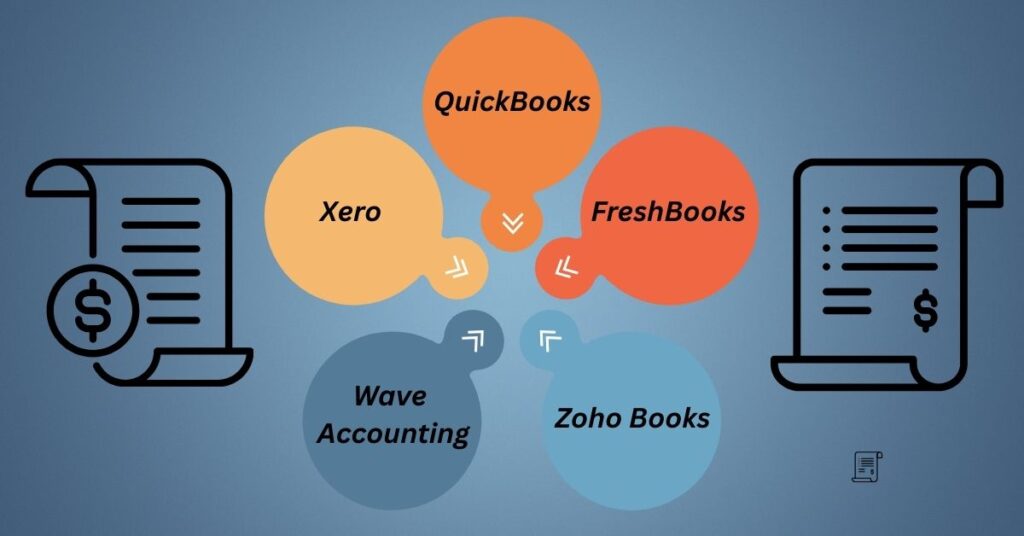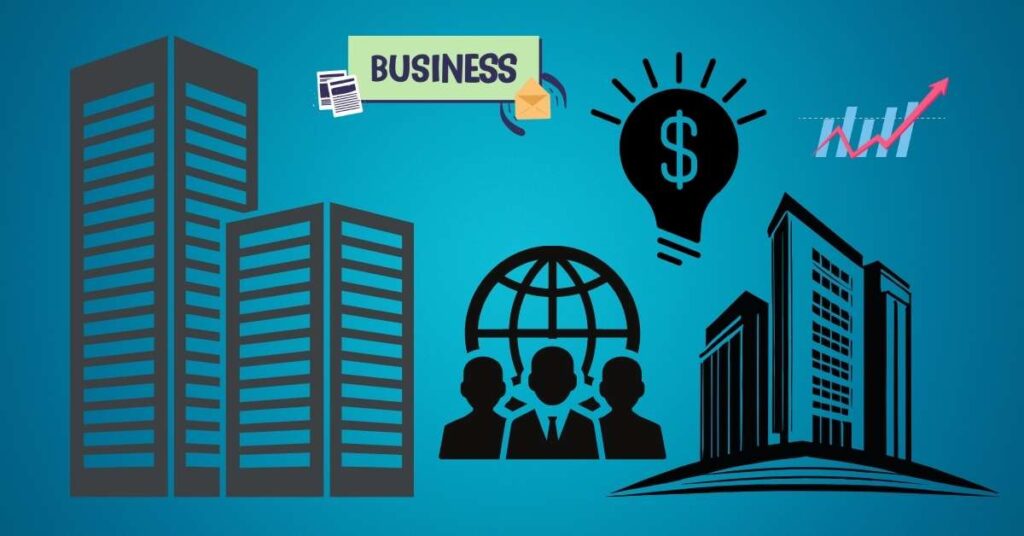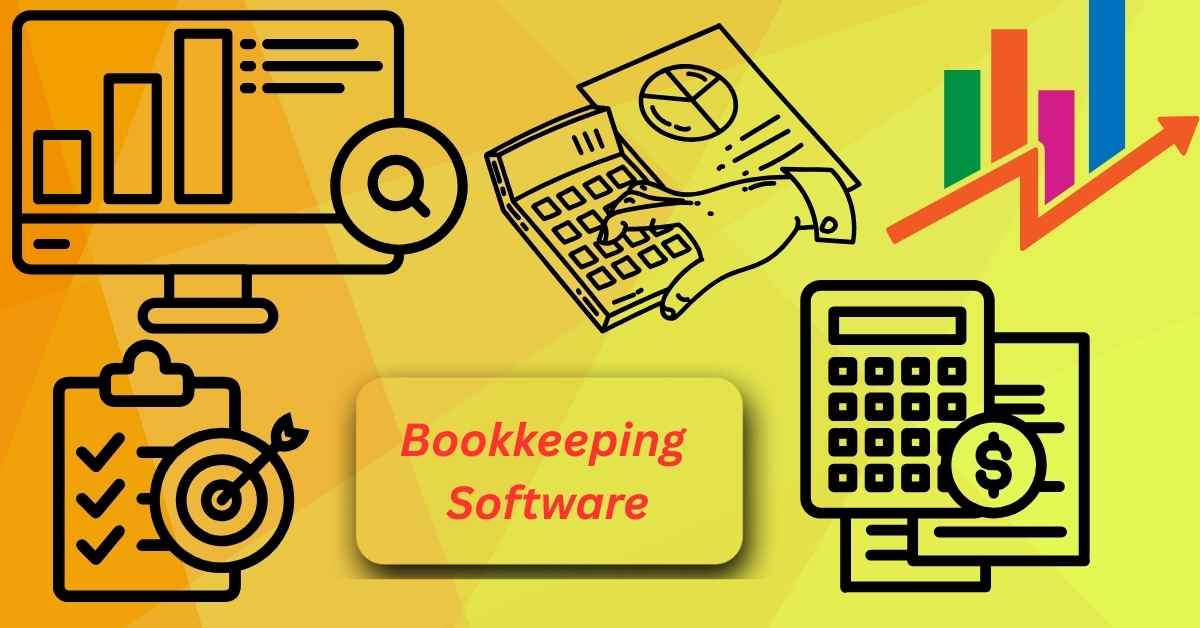Top 5 Best Bookkeeping Software to Work with Accounting: 2025 Guide
Digitalization of financial management has transformed the way businesses are required to carry out their bookkeeping and accounting. With the global accounting software market expected to grow to $70.2 billion by 2030 at a compound annual growth rate (CAGR) of 19.6%, choosing the right bookkeeping software has become crucial for business success.

This guide will focus in detail on the best bookkeeping software opportunities of 2025, their specific use, and how they will assist you in transforming how your business operates.
Knowing the Uses of Modern Bookkeeping Software
Contemporary bookkeeping software can be used in many ways other than keeping records. Such systems are one-stop-shop financial management systems that make financial processes simple, accurate, and provide business insights.
Its primary uses include transaction recording, financial reporting, tax preparation, cash flow, development of invoices, and expenses recording and business analytics. The knowledge about these basic functions helps companies to select software that would be best suited to their business and developmental objectives.
Best Bookkeeping Software of 2025

QuickBooks Online: Industry Standard
The market leader when it comes to comprehensive accounting solutions is QuickBooks Online. The most outstanding bookkeeping software, including QuickBooks, Xero, and FreshBooks, has comprehensive features in the areas of invoicing, expense tracking, and financial reporting, and QuickBooks has been ranked among the top accounting software among small and medium-sized businesses
Key Features:
- High-level invoicing and payment processing
- Detailed costing and classification
- Detailed costing and classification
- Powerful financial reporting and analytics
- Inventory management functions
- Integration of payroll and taxes
- Functionality of mobile apps
- Role-based user access Multi-user access
- Automation of bank reconciliation
- Computation and filing of sales tax
- Integrating time tracking: Time tracking integration
Primary Uses:
Financial Record Keeping: QuickBooks Online has done a great job at storing all of your financial records and auto classifying them, and maintaining your books in real-time. Small companies use it to track income and expenses in different accounts, and this will imply that there is proper documenting of finances to satisfy taxation requirements and business analysis.
Invoice Management: The invoicing feature of the platform enables businesses to generate professional invoices, establish recurring payments with frequent clients, track the payment status, and receive automatic payment reminders. It is helpful to service providers, particularly in its time tracking integration, that automatically converts billable hours into invoices.
Tax Preparation and Compliance: QuickBooks Online makes tax preparation easier since it keeps financial information throughout the year, estimates taxes, and generates reports to file taxes. It is linked with the well-known tax software and provides end-of-year summaries that can be utilized by accountants easily.
Cash Flow Management: The software also provides the business with the capability of cash flow forecasting, where the business is able to know how it will perform in the future in terms of finances, depending on the current trends and pending transactions. This capability is required to schedule large purchases, to withstand seasonality, and to have sufficient working capital.
Best Fit: Small to medium-sized business with all the accounting requirements, inventory, and advanced reporting.
Pricing: It has numerous packages, from entry-level plans to enterprise-level solutions, and the features can be scaled to the size of the business and the needs.
Xero: Accounting With A Team In Mind
Xero has become a strong cloud-based accounting system, particularly among small businesses and accounting practitioners. The Xero online accounting software connects your business with your bank, accountant, bookkeeper, and other business applications, and therefore it is an excellent choice in shared financial management.
Key Features:
- Unlimited users in each plan
- Powerful bank reconciliation features
- Third-party application integrations: Extensive third-party app integrations
- Multi-currency support
- Time and project tracking
- Full dashboard and reporting
- Mobile accessibility
- Tracking of fixed assets
- Purchase order management
Primary Uses:
Collaborative Financial Management: Xero has unlimited access to users and thus it is well-suited to businesses that have a number of stakeholders requiring access to financial data. This will facilitate communication and decision making, and it will also allow accountants, bookkeepers, business owners, and employees to work simultaneously without incurring any additional costs that may be involved on a per-user basis.
Multi-Currency Operations: Companies that do business overseas also enjoy the powerful multi-currency capability in Xero, which automatically adjusts to changes in exchange rates, follows foreign currency transactions, and creates reports in foreign currencies. It is a fundamental aspect that is required in import/export business and companies that have foreign customers.
Third-Party Integration Hub: Xero has a large app market with which businesses are able to integrate with specialized applications that include inventory management, point-of-sale systems, e-commerce platforms, and industry-specific applications. This creates one business management environment, which eliminates data siloes and manual data entry.
Project-Based Accounting: Services businesses can use the project tracking facilities within the platform to track profitability by project, time, and expenses against individual jobs and generate financial reports by project. This feature is particularly helpful to consulting firms, creative agencies, and construction firms.
Best Fit: Companies that require unlimited access by the users, good integration, and accounting processes.
Pricing: It is priced on a monthly basis and does not have limitations in terms of users, thereby making it affordable to every team irrespective of the size.
FreshBooks Service-Provider Expert
FreshBooks is a cheaper alternative to QuickBooks that facilitates the accounting requirements for freelancers and independent contractors. It is user-friendly and thus best suited to non-accountants.
Key Features:
- Easy-to-use Invoice Designer
- Tracking time and project management
- Accounting of expenses with receipt capture
- Client portal to communicate easily
- Basic financial reporting
- Integration of payment processing
- Easy tax filing software
- Computerized late charges
- Proposal and estimate development
Primary Uses:
Client Relationship Management: FreshBooks also excels in the area of client relationship management; the company has a special client portal where the customers can view their invoices, pay, approve estimates, and communicate with service providers directly. This openness enhances customer satisfaction and minimizes administrative costs.
Time-Based Billing: The advanced time tracking system of the platform allows service providers to charge accurately based on the time they spend on a project that is either on an hourly basis or on time tracking to manage the project. It can be used in the background, and one is not losing any billable minutes.
Expense Management: FreshBooks is a much easier process to manage expenses through mobile capture of receipts, automatic tracking of mileage, and categorizing of expenses. Tracking business expenses and charging reimbursable costs to clients will also be easy for service providers, which will improve cash flow and profitability of projects being undertaken.
Project Profitability Analysis: This accounting software provides extensive project profitability analysis that shows the real times and costs as compared to the projected ones and allows the service providers to identify their most lucrative clients and kinds of projects. Such data can be used to make improved pricing and resource-allocation decisions.
Best For: Freelancers, consultants, and other small businesses that are service-based and prefer the easy convenience of use and handling clients.
Prices: The prices depend on the number of clients, and the initial price is affordable to an entrepreneur.
Wave Accounting: Free Foundation Solution
Wave is a completely free bookkeeping software, which is one of the reasons to consider it among startups and the smallest businesses with the lowest budgets.
Key Features:
- Free basic accounting features
- Simple invoicing and payment processing
- Tracking of expenses and scanning of receipts
- Reconciliation and bank connection
- Simple financial reporting
- Integration of tax preparation
- Access to mobile apps
- Multi-business management
- Simple inventory management
Primary Uses:
Financial Management of the Startup: Wave provides the bookkeeping functions required in a new firm without incurring monthly expenses in using software. Start-up gives them an opportunity to establish the right financial recording keeping practices that can be utilized as a benchmark on which they can build in the future, and even when pitching to prospective investors.
Basic Income and Expenses Tracking: The site covers the low-end needs of accounting, such as recording of income, grouping of expenses, and simple financial reporting. The small businesses are able to use proper books that they can use to pay taxes and monitor their businesses without incurring the cost of using options that are more expensive.
Simple Invoicing: The invoicing solution of Wave enables small businesses to generate professional invoices, accept payments, and manage customer data. It lacks all of the functionality of commercial solutions, but is functional enough for companies without complex billing requirements.
Multi-Business Management: Wave can be used by entrepreneurs who have more than one small business to maintain separate books on each of the businesses, but view everything in one place with just one login. The feature comes in handy to individuals who are freelancers and have multiple sources of income or to small business owners who have multiple investments.
What it excels at: Start-ups, micro-businesses, and entrepreneurs requiring only a small amount of bookkeeping software functionality, but do not require a monthly subscription.
Cost: It is free with optional paid services on payroll and payment processing.
Zoho Books: Business Suite
Being part of the broader Zoho business suite, Zoho Books offers complete accounting capabilities and is thus an excellent value to other Zoho users.
Key Features:
- Full accountancy and bookkeeping software
- Serial number tracking of inventory
- Billing and tracking of projects
- Multi-currency support
- Elevated reporting and analytics
- Connection with the Zoho ecosystem
- Mobile applications
- Automated workflows
- Vendor and customer portal
Primary Uses:
Business Integrations: Zoho Books can only shine when it is part of a larger business package like Zoho, where the accounting data is integrated into CRM, inventory management, and project management, among other business processes. With such an integration, the business intelligence becomes end-to-end, and the data silos are eliminated.
Heavy-Inventory Business Management: The system has an inventory management system that monitors stock, reorder point, multiple warehouses, and a comprehensive view of inventory. The manufacturing and retail sectors are happy with the fact that it is able to trace raw materials, finished products, and work-in-progress inventory.
Multi-Location Operations: Zoho Books gives businesses with multiple locations the capacity to monitor income, expenses, and inventory in several locations and have consolidated reporting. The feature can be applied in franchises and organizations with multiple branches or warehouses.
Automated Business Processes: The workflow automation feature of the software minimizes manual data entry and enhances the efficiency of the processes. Automation enables businesses to create invoices, payment reminders, recurring bills, and get approvals, and employees can focus on more value-adding activities.
Great In: Companies that already have implemented other Zoho tools or need integration of a business management system.
Pricing: Fair prices and plans based on the quantity of features needed and the number of users.
Industrial Uses

E-commerce and Retail Apps
Bookkeeping software is used in a retail situation to perform certain tasks such as inventory valuation, sales tax calculations in various jurisdictions, and point-of-sale system integration. Automatic import of transactions on platforms which include Shopify, Amazon, and eBay are particularly beneficial to e-commerce businesses, as is the calculation of cost-of-goods-sold and tracking of marketplace fees.
Uses in the Service Industry
Time tracking, project-based profitability analysis, client billing management, and retainer management are some of the uses of bookkeeping software by professional service firms. The software helps in monitoring billable and non-billable hours, budgets of projects, and generating reports to be displayed to the clients and internal performance reports.
Manufacturing and Distribution Uses
Manufacturing companies use bookkeeping software in the complex management of inventory, such as raw materials, work-in-progress, finished goods, and multi-location inventory. The system facilitates the complex cost accounting requirements and provides information on the efficiency of production and the cost of materials.
Applications of Non-Profit Organizations
The special characteristics of fund accounting, grant tracking, donor management integration, and compliance reporting of the non-profit organizations exist. The software is useful in proper segregation of restricted and unrestricted funds, as well as providing transparency to the board members and regulatory agencies.
Advanced Uses and Capabilities
Business Intelligence and Analytics
Recent bookkeeping software has advanced business intelligence features, which are used to derive insights based on financial information to aid strategic decision-making. They can conduct customer profitability analysis, seasonality trends, and key performance indicators, and generate user-defined dashboards that provide real-time business metrics.
Cash Flow Forecasting and Planning
The advanced technologies of cash flow management help companies to predict their financial situation in the future based on previous data, expected invoices, and expenses. The functional feature helps in strategic planning, helps in forecasting potential cash deficits as well, and enables proactive financial management.
Audit-Support and Compliance
Bookkeeping software keeps an extensive audit trail, facilitates regulatory compliance needs, and documents that are required during tax audits and financial reviews. The software enhances the integrity of the data and provides transparency as required by the accountants and the regulatory bodies.
Best Practice and Implementation Strategies
Data Migration and Set up
Data migration out of the current systems should be well planned, the chart of accounts and automation rules should be well set to achieve the implementation. It is advisable that the businesses migrate the data and test on sample data, and verify accuracy before fully migrating to the new system.
Training and Adoption of Users
Proper training will make the users aware of the capabilities of the software and enable them to utilize its features. It is general navigation training, training on specific processes, and ongoing training on new features and best practices.
Integration Planning
The latest modern bookkeeping software that is modern is most effective when it is combined with other business systems. Such integration planning involves the identification of connection points, establishing the data flow, and testing all the interconnections to ensure that they are smooth.
Trends in the Future and New Uses

Applications of Artificial Intelligence
Artificial intelligence-enabled capabilities are changing the capabilities of bookkeeping software, such as smart transaction classification, anomaly detection, predictive analytics, and report generation. These properties reduce the amount of manual entry of data and also improve accuracy, as there is more knowledge of the business.
Mobile-First Functionality
The increasing mobile capability enables the business owners to manage finances anywhere, including mobile receipt capture, real-time financial management, mobile payment processing, and field-based expense tracking. It is a factor that enables contemporary business activity and working remotely.
Custom Development and API
Advanced users leverage application programming interfaces (APIs) to create custom integrations, automate complex workflows, and connect bookkeeping software with proprietary business systems. This point allows extremely tailored answers to individual business needs.
Conclusion
When choosing the appropriate bookkeeping software, it is necessary to consider not only the present needs but also the development strategy. Overall, the accounting software market has been on a growth streak since 2020 and provides businesses with enhanced financial management software, operational efficiency, and business intelligence tools.
The software solutions have different business models and applications. QuickBooks Online does very well in business expansion, Xero is perfect in collaborating with multiple users, FreshBooks is perfect for service providers, Wave is free and provides the basic functions, and Zoho Books has the capability of integrating with the business as a whole.
The successful implementation is achieved in cases when the use cases are identified, the feature requirements comprehended, and scalable growth planned. Bookkeeping software solutions can turn financial management into a strategic business advantage, helping to provide insights that can be used to make better decisions and achieve higher profitability, and turn financial management into a compliance requirement.
Whichever solution you decide to use, quality bookkeeping software will make operations easier, enhance the accuracy of financial records, ensure that the records are compliant with regulations, and the database on which the business can grow and succeed sustainably.
Related Articles:
- Remote Marketing Jobs: A Step-by-Step Guide to Opportunities and Strategies to Succeed
- What are Accounts Payable? Its Definition, Process, and Best Practices
- 10 Fundamental Accounting Principles Every Business Owner Must Know
- Fixed Index Annuities: Your Way to Financial Confidence and Security
- QuickBooks Excellence: Transform Your Accounting Game with These Powerful Techniques
- Inbound vs. Outbound Marketing: The Great Debate That’s Reshaping Business Strategy
- How to Master Balance Sheet Analysis? Expert Guide with Examples
- Income Statement Formats: Complete 2025 Guide with Examples and Structure
- What Are Current Liabilities And Why They Matter For Financial Success
- Current Assets Essentials: Elevate Your Financial Management Game
- Remote Payroll Jobs: Your Gateway to Flexibility and Financial Growth
- Payroll Advance: Powerful Ways to Enhance Workplace Morale
- Powerful Mobile Marketing Strategies You Must Try
- Best Marketing Tools In An Advertising Plan
- Mastering Revenue Expenditure for Business Success
- Market Research And Its Importance: A Comprehensive Review
- What You Should Know? Notes Payable And Accounts Payable
- Digital Marketing And Strategies: A Comprehensive Review with Examples
- Are Annuities the Best Investment for a Bright Future? A Comprehensive Analysis
- Understanding Capital Expenditure: Definition, Significance, and Its Association in Financial Decision-Making
- Difference Between Accounting And Finance: A Proven Comprehensive Guide For Beginners
- Difference between Annuity due and Ordinary Annuity
- Essential Accounting Software for Small Enterprises
- 5 Best Software For Small Business Accounting







